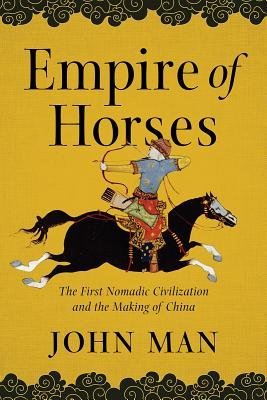Empire of Horses by John Man
Review of Empire of Horses by John Man
Empire of Horses by John Man (2020). Published by Pegasus Books.
History books have always been my favorite kind, and if money wasn’t a concern in my life, I probably would have majored in history throughout my undergraduate education and gone on to get a PhD in it. Who knows, maybe I’ll do that, but for now I’m settling with my master’s degree.
But whenever I’m at the library I always try to go to our tiny history section and pick out a few books here and there to discover something new about the world. Asian history is my specialty, and although my thesis is on colonial Korean women’s literature, my first love was always the region now known as China.
So when I saw Empire of Horses, I picked it up immediately knowing what it was going to be about. I knew the Mongols were well known because of their prowess on a horse, but I didn’t know much of their in-depth history.
This book was the perfect opportunity for me to go and dig deeper into what there was leading up to such a big conquest across the world, as the Mongols definitely made their way East and West.
Here’s my review of Empire of Horses!
The story of the Xiongnu, who would eventually become the Mongols.
Man begins this book many many years ago, when the steppes of the mountains of West Asia were inhabited by people now marveled at today. They have fairer skin and are nomads, leading to the sense of what’s to come. The first few chapters are specifically on the Scythians, who are these people.
We typically don’t know much about them or their customs from direct sources, but we do know the objects they left behind, which were mainly metal, and the fact that they were once a big part of exchange and the Silk Road.
From the Scythians, we get the people who would become the Xiongnu. I think something to note about these kinds of texts is that because these nomadic tribes didn’t really take their own records, a lot of the sources we have are from the Han Chinese and the dynasties.
And the Xiongnu had this kind of relationship with them where they would ransack towns whenever they needed supplies or food, so obviously the dynasties were pissed off whenever the Xiongnu showed up.
The term in translation used is barbarian, as they were depicted as people who didn’t really have a culture or class. One of the more interesting stories in the book for me is about one of the Great Four Beauties of China: Wang Zhaozhun.
She was essentially chosen from her village by the emperor to marry one of the Xiongnu leaders, and the legend has really been twisted throughout the years to show how she wanted to go home but couldn’t.
We also begin to see the manipulation of history and their depictions with the story of the Chinese historian. Man has this slightly annoying job where he ends up going on modern tagents explaining how he went to China and the steppes to figure out something, or see a dig, and I think while this could work in a memoir, it really doesn’t work in this book specifically.
I wanted the book to strictly focus on the history, and when we get random excerpts of his adventures in China, it becomes distracting for the information I actually wanted to see.
Anyways, the remainder of the book is showing how the Xiongnu increasingly became a threat to the dynasties, and then they eventually evolved into the Mongols. The Mongols very much consider them to be their ancestors, so they take claim over the Xiongnu and their deeds.
Man suggests that the unification of China made the allure of ransacking them even more tempting for these kinds of groups, which is pretty smart if you’re asking me.
Overall Thoughts
I think this was a good primer book if you’re starting to get your toes wet in the topic, and one of the few accessible histories on these people out on the market. Let’s face it: if you’re not an academic, it’s really hard to find books about certain things out in the wild.
The Xiongnu are one of those topics, and while I currently have access to a graduate school library, I think that it would be a lot harder for other people to learn about them.
Regardless, I think this book does have some flaws, but they didn’t completely hinder my reading experience. They were just inconvenient at times.
Follow me below on Instagram and Goodreads for more.


![Jeju-do (제주도) is one of those places that reminds you of how stunning the world is
[7.12.2024 부터 7.14.2024 까지]](https://images.squarespace-cdn.com/content/v1/5ea1f794501b7153b29e7cd7/1721033601522-554E76HR01JUHDWZBJ1I/image-asset.jpeg)









